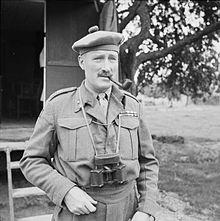Neil Ritchie
Sir Neil Methuen Ritchie KCB , KBE , DSO , MC (born July 29, 1897 in Georgetown , Guyana , † December 11, 1983 in Toronto ) was a British general in World War II .
Ritchie went to school at Lancing College in West Sussex . He then attended the Royal Military Academy Sandhurst . His military career began in 1914 when he became an officer in the Black Watch . During the First World War he fought in France and Mesopotamia . In 1918 he was awarded the Military Cross .
When World War II broke out, Ritchie held the rank of brigadier . In 1939 Ritchie was transferred to France as part of the British Expeditionary Force , where he served on General Sir Alan Brooke's staff . After the Battle of Dunkirk , Ritchie was transferred to Sir Claude Auchinleck's staff . Between October 1940 and June 1941 he commanded the 51st (Highland) Division . Auchinleck gave him command of the British 8th Army in November 1941 . At the same time, Ritchie was promoted to lieutenant general .
Ritchie was unlucky to be in command during a period when the British Army suffered many defeats. The 8th Army in North Africa was the only land force that fought against the German units. After a few initial victories against the Italians, the British were pushed back by the German Africa Corps under the command of Erwin Rommel . Ritchie was originally intended as a temporary captain to be replaced as soon as a better commander was found. Nevertheless, he was commander of the 8th Army for six months. After the British were able to gain some victories again, they were again thrown back by the Germans, with the important port of Tobruk falling into opposing hands. As a result, Ritchie was deposed by Auchinleck in June 1942, before the first battle of El Alamein . Ritchie was heavily criticized both before and after the war for not being able to stop Rommel. Since then, many commentators, including Michael Carver , have defended him.
After Ritchie had been replaced as commander of the 8th Army, he was given command of the 52nd (Lowland) Division on September 11, 1942 . He later led the British XII Corps during Operation Neptune . The fact that Ritchie, unlike his predecessor as Commander of the 8th Army, Alan Cunningham , was given command after his impeachment reflects the high esteem he received from the Chief of the Imperial General Staff Sir Alan Brooke.
After the war, Ritchie remained in the army and commanded the Scottish Armed Forces until he was promoted to general and commander in chief of the British Forces in the Far East . After retiring, he emigrated to Canada and became chairman of an insurance company, the Mercantile and General Reinsurance Company .
Neil Ritchie died in Toronto on December 11, 1983 at the age of 86 .
Awards
On July 5, 1945 he was made Knight Commander of the Order of the British Empire and thus in the knighthood . From then on he carried the suffix "Sir". On June 12, 1947 he was also Knight Commander of the Order of the Bath and on June 7, 1951 Knight Grand Cross of the Order of the British Empire.
Individual evidence
- ↑ a b Knights and Dames: RAE-SEK at Leigh Rayment's Peerage
Web links
- Information at spartacus.schoolnet.co.uk (English)
- Information on historylearningsite.co.uk (English)
| personal data | |
|---|---|
| SURNAME | Ritchie, Neil |
| ALTERNATIVE NAMES | Ritchie, Neil Methuen (full name) |
| BRIEF DESCRIPTION | British general in World War II |
| DATE OF BIRTH | July 29, 1897 |
| PLACE OF BIRTH | Georgetown , Guyana |
| DATE OF DEATH | December 11, 1983 |
| Place of death | Toronto |

